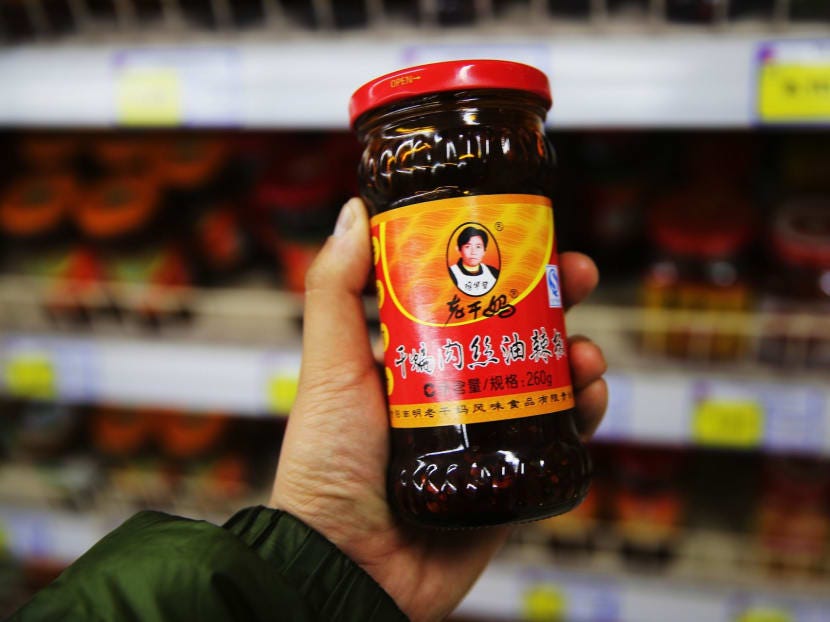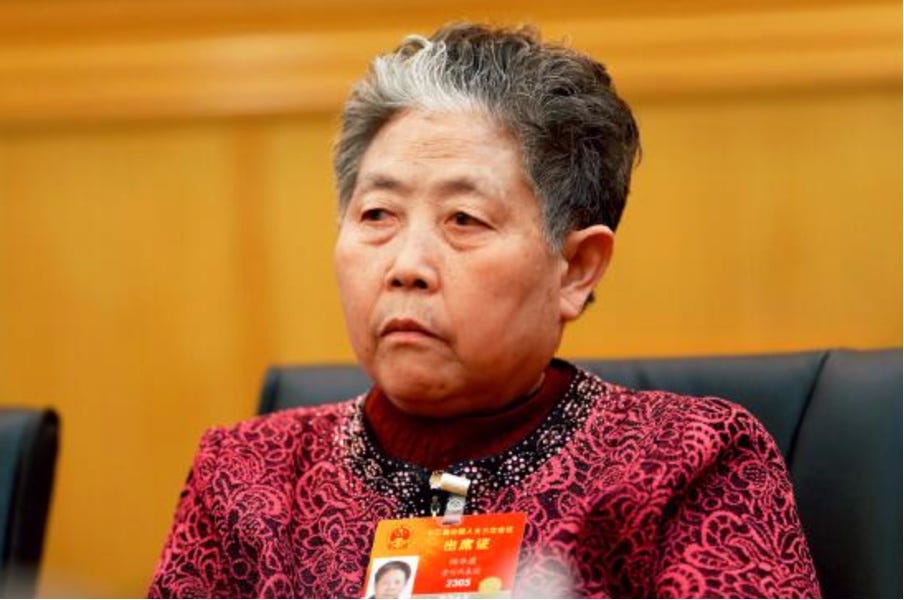Lao Gan Ma
China’s Cherished Chilli Condiment
Lao Gan Ma absolutely slaps and I pity the fool yet to try it.
But the backstory of China’s favourite condiment and its founder is just as interesting.
Want to watch this post instead?
Tao Huabi (陶华碧), creator of Lao Gan Ma. The sauce that is a household name in China, has a cult following worldwide, and food-wise can complement pretty much anything.
To say Tao came from extremely humble beginnings would be an understatement. Yet she’s created one of China’s most well-known and well-loved condiments. This is the tale of Tao Huabi and one of China’s favourite brands.
In 1947, Tao was born on a farm in Yongxing Town, Meitan County, in Guizhou province. The eighth daughter in the family, as her parents were hoping to finally have a son. But after Tao, there was another younger sister who was born, but she, unfortunately, starved to death.
Times were tough. Tao’s parents struggled to feed and clothe their children, let alone give them a proper education. So unsurprisingly, Tao was never taught how to read or write.
During the Great Chinese Famine from 1959 to 1961, Tao had to resort to digging for wild vegetables, using whatever was available to make her limited food edible. This poverty and hunger drove Tao to make her very first chilli sauce, made from medicinal plants and home-grown chilli peppers.
In 1967 when Tao was only 20, she married a local accountant, with whom they would eventually have two sons together, but the good life would not last long.
Just a few years into their marriage, Tao’s husband became seriously ill with liver disease. Tao was in a pickle; she was uneducated, illiterate, and had no official working experience. But she needed to provide an income for her family as they had no money to cover her husband’s medical costs, let alone for the family’s food and education.
This situation caused Tao to leave the countryside for the first time to go to Guangzhou to find a factory job. She brought her chilli sauce with her and used it to flavour steamed buns when she couldn’t afford any other food.
Chilli Queen Origins
Unfortunately, Tao’s husband would eventually pass away. Now a widow and sole caregiver, she returned back to Guizhou to take care of her two sons. To make ends meet, she started making bean curd at night and selling it the next day around the schools in Longdongbao.
Tao would buy the ingredients she needed from a store on Youzha Street, which was ~5 km away. She would aim to board the first bus of the day, but the bus drivers often refused to let her on because her basket took up too much space. So more often than not, Tao walked the 5km each way to get the ingredients she needed. This grit and determination would translate well into Tao’s future business endeavours which we’re about to see.
Fast forward a while, after Tao’s sons had grown up, she was visiting a noodle shop after work and complained to the owner that their cold noodles were not authentic enough. Tao gave the owner her advice on how to improve the noodles using chilli oil, and unexpectedly Tao was offered a job at the restaurant! This experience would be critical in giving Tao the idea to start her own business.
So finally when Tao was 42, she took the plunge and set up her own restaurant in the Nanming District of Guiyang in Guizhou. A customer recalls the humble store beginnings: “We called it a restaurant, but, other than the back wall, which was part of the Guiyang Offical Duty Courtyard, it was no more than a roadside stall constructed out of broken bricks, asphalt felt and other debris”
She served simple noodles but mixed them with her signature spicy hot sauce with soybeans. Tao's generous helpings at low prices drew students from nearby trade schools. She would let those from poor families run up a tab, which she would later cancel.
Tao’s noodle business was booming – but not because of the noodles! The chilli sauce that Tao had been working on for years was the magnet that drew customers. Slowly, she realised the popularity of her condiment when people started coming in to purchase the sauce sans noodles.
Tao’s Truckers
Word started to spread about Tao and her chilli sauce too. In 1994, the construction of a new highway in the area meant a lot more truck drivers started to pass by Tao’s store. Tao took this as a chance to promote her condiments outside the realm of her own neighbourhood and started giving out her sauces for free for the truckers to take home. These truck driver customers proved invaluable advertisers, spreading Lao Gan Ma far and wide to countless Guiyang households. Causing people to drive from the inner city to the outer suburbs just to buy her chilli sauce. Word-of-mouth marketing was THE driving factor for the Lao Gan Ma taking off.
Another incident would reinforce the idea that the future of the business relied solely on her condiment. One day, when the sauce had sold out, customers would not even eat her noodles without her special sauce! Add to this that Tao learned that other noodle shops in the neighbourhood were all doing good business by using her homemade sauce in their noodles. But getting her to close her restaurant and focus solely on the sauce was a different story.
Nanming officials tried desperately to persuade Tao to give up on the restaurant and open a chilli sauce factory, but she refused. Her reasoning? “If I close my restaurant, where will the students eat?”
In the end, even the students she looked after even began urging Tao to go all-in on the production of her sauces. Finally, in August 1996, at the age of 49, she relented and borrowed two buildings from the local government to set up her factory.
She recruited forty workers, and since the factory initially had no machines, the chore of chopping chunky Chinese chillis was done manually. Tao herself would help cut chillis at the factory tables together with her workers. Although Tao never had any formal education, she turned out to have a natural talent for managing her flourishing company.
It wasn’t smooth sailing to the top though. Despite the sudden rise and success of Lao Gan Ma, (or maybe because of it) Tao struggled for years as a handful of competitors launched fake copycat sauces with similar packaging, which nearly ruined her business.
Luckily, the high court in Beijing finally ruled in 2001 that other similar products could not use the “Lao Gan Ma” name nor imitate her packages. A rare W for intellectual property rights in China.
Fast forward nearly 20 years and in 2015 Forbes calculated Tai Huabi’s wealth at over a billion dollars. In 2019, Lao Gan Ma was selected as one of the top 100 brands in China, together with other famous national brands such as China Mobile, Huawei, Tik Tok, and Alibaba. In 2020, the company saw its annual sales revenue reach a record high of more than $800 million, and today, Tao’s ‘chilli empire’ has gone global. Lao Gan Ma produces more than 2.3 million bottles a day, uses 45,000 tons of chilli peppers a year, uses more than 100,000 tons of vegetable oil, and now exports to more than 30 countries!
Apparently, Tao operates Lao Gan Ma with four “No’s”: no tax evasion, no loans, no debt, and no IPO listing. Tao says, “I don't know anything about listing and financing. All I know is that once you go public, you may go bankrupt. Listing is deceiving people's money, so I am determined not to go public.”
In the last few years, Tao has passed over control of the company to her two sons (Li Guishan 李贵山 and Li Hui 李辉), and the jury is out on how successful they’ve been. But one thing remains certain, the popularity of Tao Huabi and Lao Gan Ma isn’t slowing down.
Tao locally is known as the “Miracle of Guizhou”, and for good reason. Despite the many offers throughout her career to set up her business elsewhere, she always stayed true to her home province (apparently much to the delight of local government officials).
She’s been an absolute godsend for the province; not only for her brand becoming known as a unique ‘product of Guizhou’, but also for her offering employment to over 4,000 people, and directly and indirectly generating income for tens of thousands of farmers through the number of chillis she uses. I guess you could say, Tao is the hottest woman in China. 😎 (Surprised it took me this look to say that!)
When looking at Lao Gan Ma’s success in the west, it is a tad unusual. Entirely marketed in Chinese, with labels displaying no English beyond the essentials, yet people can honestly not get enough of it. The product is so damn good it doesn’t need anything else to sell it.
Lao Gan Ma rarely advertises, has minimal social media strategy, no celebrity partnerships, and the iconic design has never been modernized. “We're selling the flavour, not the packaging,” Tao says.
Lao Gan Ma has developed a powerful brand recognition that most could only dream of. And I’m looking forward to eating it on my eggs for many years to come.
You can find previous posts here. I also interview legends at Compounding Curiosity, lurk on Twitter @scarrottkalani, and have a Discord server for everything Allocators Asia (I’d love for you to join our cool little community we got going).
Want to get in contact? Reply to this email, comment on Substack, or send a letter via carrier pigeon and trust that fate will deliver it.











Awesome!! Such an amazing story of grit and resilience. Thanks for putting this out.